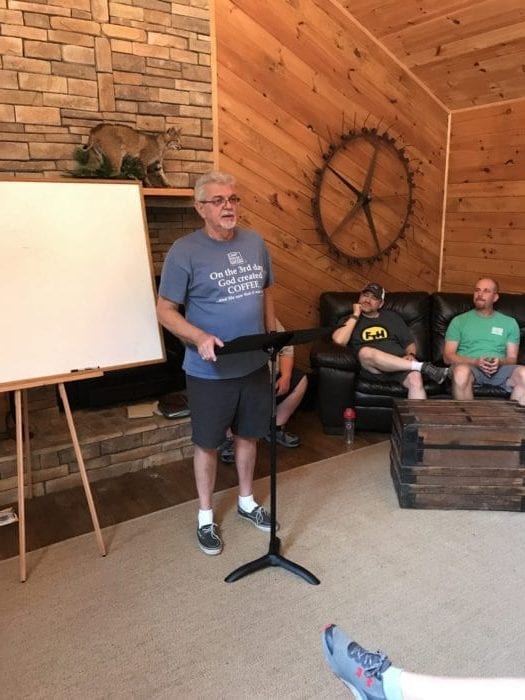filter posts:
Date
A Society Addicted to Distraction
 I find myself wondering these days what my students did in 1990 to distract themselves. That’s when I started teaching communication classes to college students, and I don’t remember any of them having cellphones back then. Or laptops, iPads and iPods. Maybe they secretly played Bon Jovi or Prince in their Walkman, one earplug in and eyes intent on me as I lectured. Some of them doodled; that’s still popular today. Some would open the school newspaper on the desk and try to read an article on the sly. A few might have tried to fall asleep, until I saw them and rudely interrupted their naptime. What I don’t remember is a student intently staring at his lap, checking his Twitter feed, his Instagram likes or his Snapchat streaks. Some are pretty good at it, and I can tell they have worked hard to master their cloaked habit. Others are about as subtle as a Trump tweet, and they just lock and load on their lap-phones, sometimes even laughing softly to themselves at something they are reading. That’s when I remind my students that I was born at night, but not last night, and would they please put their phones away?
I find myself wondering these days what my students did in 1990 to distract themselves. That’s when I started teaching communication classes to college students, and I don’t remember any of them having cellphones back then. Or laptops, iPads and iPods. Maybe they secretly played Bon Jovi or Prince in their Walkman, one earplug in and eyes intent on me as I lectured. Some of them doodled; that’s still popular today. Some would open the school newspaper on the desk and try to read an article on the sly. A few might have tried to fall asleep, until I saw them and rudely interrupted their naptime. What I don’t remember is a student intently staring at his lap, checking his Twitter feed, his Instagram likes or his Snapchat streaks. Some are pretty good at it, and I can tell they have worked hard to master their cloaked habit. Others are about as subtle as a Trump tweet, and they just lock and load on their lap-phones, sometimes even laughing softly to themselves at something they are reading. That’s when I remind my students that I was born at night, but not last night, and would they please put their phones away?
A few weeks ago I noticed a student intently staring at his watch. Then he started poking at the face of it with his forefinger. This went on for several minutes, with regular pauses. I assumed he was too tired to finish the text and needed breaks in between sentences. Bless his heart. Actually, when I first saw this, it didn’t dawn on me what the student was doing. I don’t have an Apple Watch or its clone, so my orientation is not to think “texting” when I think of my watch. When I realized what was going on, I politely asked him to crush his watch under the leg of his chair. Not really, but I did tell him to take it off and put it away. First time ever!
Look, this is not an old-man rant about modern technology. I am not yelling at anyone to get off my lawn. I am just as guilty as the next guy at allowing my smartphone to control my day, if I am not careful. Even my watch has gotten into the act. I have a Garmin watch that I bought because it has a GPS in it and is helpful for tracking my running. It also talks to my phone, and they have developed quite a close relationship. This summer a pastor in Berlin was introducing me as I sat on the second pew with Cindy, preparing to go up and preach. Suddenly, to my horror, my watch told my phone to start playing music. It didn’t matter that my phone was muted, apparently, because loud strains of “Winter Wonderland” by James Taylor began to compete with the pastor’s introduction of the idiot in the second pew. Cindy and I struggled to turn it off and I was finally forced to crush it under the leg of the pew. Not really, but I walked to the pulpit with a red face and apologized to the multinational congregation about my faux pas.
I don’t have all the answers to our addiction to distraction these days. The research is startling, and you may have read George Will’s column last Tuesday in this paper. He quoted extensively from Sen. Ben Sasse’s new book about the epidemic of loneliness as a health crisis in our nation. Will wrote, “In the last quarter of the 20th century, the average number of times Americans entertained at home declined almost 50 percent. Americans are hyperconnected but disconnected, with ‘fewer non-virtual friends than at any point in decades.’”
One answer may be to reconnect to a healthy community. Find a good church and don’t just sit in a pew; get involved in the community. You may also need to put away the phone and go retro.
Speaking of which, does anyone have a Walkman I could borrow? I think I can find my old cassette tapes in the attic.
October 22, 2018
One Town You Ought to Visit
 Have you ever heard of Lynch, Kentucky? I hadn’t either, until a few years ago. This past weekend, I got to experience what God is doing there firsthand, as 54 men and young men from Antioch had our annual retreat at Shekinah Village. That’s a youth camp and conference center tucked in a valley in the Appalachian Mountains. It’s a wonderful place that offers fishing, horseback riding, hiking, and much more. And we all took advantage of the recreational and educational activities, including touring what was once the most productive coal mine in the nation, until it was shut down in 1963. But what we came back talking about was what God shared with us while we were there.
Have you ever heard of Lynch, Kentucky? I hadn’t either, until a few years ago. This past weekend, I got to experience what God is doing there firsthand, as 54 men and young men from Antioch had our annual retreat at Shekinah Village. That’s a youth camp and conference center tucked in a valley in the Appalachian Mountains. It’s a wonderful place that offers fishing, horseback riding, hiking, and much more. And we all took advantage of the recreational and educational activities, including touring what was once the most productive coal mine in the nation, until it was shut down in 1963. But what we came back talking about was what God shared with us while we were there.
All of the people who work at Shekinah Village, or at any of the ministries that are under the umbrella of Meridzo, do so without a salary. No, they are not independently wealthy, except in faith. They trust God to supply their needs, and we heard story after story about how that is happening.
Meridzo Ministries began when Lonnie Riley left a senior pastor position in a mega-church in 1999, sold his big house and nice cars, and moved to Lynch, believing that God was sending him and his wife there to serve the people of Harlan County. Their website states, “30,000 missionaries have visited the Lynch, KY area over the last 10 years, and thousands of those ministered to have professed faith in Christ. These wonderful friends have assisted in bringing about physical and spiritual transformation to our region.” There were so many stories we heard, but one involved an African-American man, a Vietnam vet, who was living in a small house with no roof. Only a tarp covered his home, and the rain and snow had its way with him there. Lonnie heard about it and simply told the Lord that if he were given shingles, he would put a roof on the man’s house. The next day a woman called from Georgia and said she had 248 squares of shingles to donate. Do you need them?” Lonnie smiled and said, “Yes, as a matter of fact, we do.” The problem was they needed a truck to haul the shingles, so Lonnie prayed for a truck. A man called from western Kentucky to see if there was anything he could pray with Lonnie about. Lonnie told them they needed a semi. The man called back on the following Monday and said that a young man had been saved in his church recently. When the young man heard about the need for a truck, he called his non-Christian father who was in California. The father drove from California to Atlanta to Lynch at no charge. Three months later, the father became a Christian himself, as he saw that God was working in ways he could not explain. The vet’s house, by the way, took only 6 squares for the roof. They ended up putting new roofs on dozens of homes all over Lynch.
I had read Lonnie’s book, “Miracle in the Mountains.” It reads like something out of the book of Acts. I had heard about this ministry from my son Caleb, and from Scott, Joseph and others who work at Feed the Hunger, and who regularly send food to Lynch. But seeing it for myself, and meeting the men and women who have given up everything to go and work there and serve there? That was a game-changer for me. And for all 54 of us from Antioch.
During our final time of worship and testimonies on Saturday morning, one of the men said what we all were feeling. Todd said, “We cannot all leave our jobs and come to Lynch. There have to be people whom God calls on to supply the needs for that kind of ministry. But we can all live more simply, give more, and live by faith more. That’s the lesson I am taking back home.”
I thank God for Meridzo Ministries, and for allowing us to be a part of what he is doing there.
October 15, 2018
Why Forgive When You Can Sue?
 Imagine this scene. One of your neighbors calls on a Saturday morning with an urgent request to come immediately to his front yard. You hang up and hustle over there, to find 30 chairs on his lawn, most of them already filled with neighbors. Directly in front of the chairs you see two children on a bench, sitting quietly and studying the ground. As more neighbors wander in, you see shrugs and hear whispers of ‘what’s going on?’ Then the neighbor who called the gathering stands in front and thanks everyone for coming. “When I woke up this morning,” he says, “I awoke to screaming. I ran into the living room and found these two children (pointing at the defendants) fighting with one another over a toy. They were both angry and red-faced, and each was absolutely certain that he had possession of the toy first. I need your help,” he says, “to resolve this matter.” His face is grim and his eyes pleading. His wife has refused to come out, but you see occasional glimpses through the bay window, as she hides behind the curtains in the living room.
Imagine this scene. One of your neighbors calls on a Saturday morning with an urgent request to come immediately to his front yard. You hang up and hustle over there, to find 30 chairs on his lawn, most of them already filled with neighbors. Directly in front of the chairs you see two children on a bench, sitting quietly and studying the ground. As more neighbors wander in, you see shrugs and hear whispers of ‘what’s going on?’ Then the neighbor who called the gathering stands in front and thanks everyone for coming. “When I woke up this morning,” he says, “I awoke to screaming. I ran into the living room and found these two children (pointing at the defendants) fighting with one another over a toy. They were both angry and red-faced, and each was absolutely certain that he had possession of the toy first. I need your help,” he says, “to resolve this matter.” His face is grim and his eyes pleading. His wife has refused to come out, but you see occasional glimpses through the bay window, as she hides behind the curtains in the living room.
What would you say to your neighbor, besides, “Have you have totally lost your mind?” You would tell him that this is not a neighborhood matter, but a family matter. Surely, you might say, you are able to handle disputes among your own children.
Silly analogy? Perhaps, but it’s not too far off the beam. The church in Corinth in the first century was no different from the church in your neighborhood, and mine. Church members were taking each other to court, and Paul was incredulous. He was not stupefied by the fact that there were grievances among them. That happens in any family. He was amazed and saddened that they were airing their dirty laundry in public.
One of the favorite pastimes of the ancient Greeks, and, it would seem, the modern Americans, was to take someone to court. Or at least to go watch a friend sue somebody in court. Better yet, you could be chosen one morning to serve on a jury. There could be 200 jurors, plus one to break a tie, in a normal court case. In some cases, as many as 6,000 people served on the jury. Just imagine the chaos in that deliberation room.
If you read the text in Paul’s letter, you will notice that the apostle was not writing to the city fathers of Corinth, trying to change the mindset of the world. He was writing to Christians, in the church, who were taking their fellow Christians to a civil court, laying their cases before “those who have no standing in the church.” Disputes between believers should be settled in the church, not in the court system. There are exceptions to that rule, I know. If a man is physically assaulting his wife, for example, that is a legal matter that will be handled as such, as any legal matter should. But if one man in the church slanders another, or if a woman takes up an offense for her child, that is a matter for the church members themselves to resolve.
The late associate justice on the Supreme Court, Antonin Scalia, wrote this about our litigation-loving land: “I think we are too ready today to see vindication or vengeance through adversary proceedings, rather than peace through mediation…Good Christians, just as they are slow to anger, should be slow to sue.” Robert Taylor said, “Litigation is a manifestation of an absence of community.”
Got a grievance with your kids’ behavior? That’s a family matter. Got a beef with a brother in the church? That, too, is a family matter. Work it out, to the glory of God and for the sake of peace.
October 8, 2018
Come Let Us Worship
 The people in Acts 12, listening to Herod give a speech, shouted, “The voice of a god and not of a man!” They were in the flesh and so was he and soon he was in the grave. When he received the praise of men, an angel of the Lord struck him, because he did not give glory to God, and he was eaten by worms and died. Here’s a good thing to remember: wrong worship leads to worms. I am not being funny. When men choose to worship themselves rather than their Creator, that worship stinks. It is wormy and corrupt, good for nothing.
The people in Acts 12, listening to Herod give a speech, shouted, “The voice of a god and not of a man!” They were in the flesh and so was he and soon he was in the grave. When he received the praise of men, an angel of the Lord struck him, because he did not give glory to God, and he was eaten by worms and died. Here’s a good thing to remember: wrong worship leads to worms. I am not being funny. When men choose to worship themselves rather than their Creator, that worship stinks. It is wormy and corrupt, good for nothing.
Read Psalm 95 for a primer on how and why we worship. The verbs tell the story in the first few verses. Come. There is a movement on the part of the worshiper from where he is to a place where he will worship. If you are driving down the road on the way to work and your mind is filled with many things, you can “come” to worship right there and begin to praise God. Do it. Also, don’t neglect to “come” to worship with the saints in the house of God.
Sing. Worship and music are made for each other. And notice in Psalm 95, the invitation is corporate: let US sing. Worship is contagious. I am lifted higher in my worship when I am standing with people singing with all their might to the Lord. When I am surrounded by my brothers and sisters in Christ, I am moved by the power of God working in their lives as they worship.
Shout joyfully. This takes freedom. It doesn’t take freedom to shout for men. People do that all the time, at ballgames or political rallies, but those who belong to God are called to shout joyfully for Him. Can you do it? Is it even allowed in your church? C.S. Lewis said, “I think we delight to praise what we enjoy because the praise not merely expresses but completes the enjoyment.” I like that. Our open exuberance for Christ makes our delight for Him even more enjoyable.
We are also to come before His presence with thanksgiving. Do you ever think about the fact that when we believers are gathered for worship, God is also there? We are joined by the One we worship. When one of my sons was about four years old, he tugged on Cindy’s shirtsleeve one Sunday during the singing and said, “Momma, God and the angels are here!” He was right. Perhaps a child’s vision for the unseen is greater than ours that has been clouded by years of ‘learning.’ By the way, here’s a side-note. I am so thankful my children have been standing beside me in worship for the past 32 years, since the oldest was able to stand. They have not been separated from their parents in another part of the building. They are better worshipers for it.
A.W. Tozer wrote 50 years ago: “To great sections of the church the art of worship has been lost entirely, and in its place has come that strange and foreign thing called the ‘program.’ This word has been borrowed from the stage and applied with sad wisdom to the type of public service that now passes for worship among us.” When we come to watch instead of to worship, we are in trouble and the church is, too. When we come to be entertained rather than invited into God’s presence, maybe we need to reexamine what worship is.”
Come, let us worship and bow down!
October 1, 2018
Church Discipline is Necessary
 The situation inside the church in Corinth was serious, because a couple practiced sin that even the pagans of that day would not permit. “A man had his father’s wife.” Paul may have been shocked by this sin in the church, we don’t know. What we do know is that he was shocked by the church leaders’ arrogance about it. Their cavalier attitude, and their boasting about it, that they were so tolerant as a church to allow this sin to go on with impunity, appalled the Apostle. Some believe that the man in question had not been corrected because he was a big donor, a big shot in the church. You can imagine the elders discussing how this man parades into the church each week with his step-mom on his arm, and they say, “Well, you know, we need to just overlook this, because what would we do about that new building we want to add to our campus if Mr. Big Shot stops coming and takes his money with him? I mean, we are planning to name it ‘Big Shot Family Life Center’ right?” The elders all stare into their coffee mugs, shaking their heads.
The situation inside the church in Corinth was serious, because a couple practiced sin that even the pagans of that day would not permit. “A man had his father’s wife.” Paul may have been shocked by this sin in the church, we don’t know. What we do know is that he was shocked by the church leaders’ arrogance about it. Their cavalier attitude, and their boasting about it, that they were so tolerant as a church to allow this sin to go on with impunity, appalled the Apostle. Some believe that the man in question had not been corrected because he was a big donor, a big shot in the church. You can imagine the elders discussing how this man parades into the church each week with his step-mom on his arm, and they say, “Well, you know, we need to just overlook this, because what would we do about that new building we want to add to our campus if Mr. Big Shot stops coming and takes his money with him? I mean, we are planning to name it ‘Big Shot Family Life Center’ right?” The elders all stare into their coffee mugs, shaking their heads.
Very simply, Paul stated the solution in his letter to the first century church: “Let him who has done this be removed from among you.” In other words, exercise church discipline. This might be shocking to some of you, that a person would be told that he couldn’t come to church anymore until he repents and renounces his practice of sin. But it is not new. It just seems that way if you have never been in a church that practiced it. Why does church discipline shock us? We are not shocked at all when we hear that the company we work for has strict guidelines for how we are to work, the time we are to put in, and the authorities we are to submit to. We are not shocked when we hear that a person was fired because he wouldn’t come to work, or he left early every day, or he was padding his expense account, or he was refusing to do his job. Workplace discipline is expected. It is the same in the academic world. No student is surprised when I tell them that they have to come to class and they have to give speeches. They are not shocked when I tell them they cannot plagiarize someone else’s speech, and they cannot cheat on the tests I give them. Classroom discipline is expected. I was in a courtroom a few years ago to support a friend who had to stand before a judge. Before the judge ever entered for the “All rise!” and before the first case was ever called, a bailiff walked through the courtroom and asked every person wearing shorts to leave. Some of them were about to be called before the judge, but they had to leave. Courtroom discipline is expected. Stephen Um writes, “It would seem that the only place that we don’t want the principles of discipline to apply is in the church. (But) if discipline is functioning properly in the church, there will be a self-correcting ecosystem, and the glaring example of hypocrisy would be greatly reduced, if not eliminated.”
The purpose of church discipline is to restore the person practicing sin, to protect the body of Christ, and to promote the message of the Gospel which teaches us that we can be set free from sin that destroys us. Do you know why most churches do not practice church discipline any more? It is simply because the culture of “tolerance” has entered the church. We have begun to believe the lie that it is more loving to let the person continue in his sin than it is to help him be free from it. We may even believe the lie that says, “It is my body, and I can do whatever I want to with it.” The Bible teaches us that we are not our own, those of us who belong to Christ. “We were bought with a price,” and a high price it was.
Churches, we need to wake up to the biblical truth that it is not our job to judge those outside the church. God does that. It is our job to judge those inside the church.
September 24, 2018
Strengthen What Remains
 Jeff and Amy Jo Akin are good friends who moved from Burlington to Louisville, Ky. ten years ago. Jeff is a leader in the Trane Corporation, but he is also a church planter. After leading a small church for several years, Jeff heard from the Southern Baptist Convention about their emphasis on church revitalization. The more he heard, the more excited he got about it. That led to a conversation with one of the men in the SBC who is leading the charge for church revitalization, and from him, Jeff got a contact name and number. The pastor that Jeff called wanted to meet immediately, and the two men spent several hours together. Dan was pastoring an aging congregation that in its heyday had 600 people coming through the doors, and now were down to 50. Jeff and Dan met together numerous times, and then got their leaders together to plan a merger. Jeff took his fifty people and joined with Dan and his fifty, the old with the young, and now they are one year into the new work. One elderly woman told Jeff not long after the new work began, “I’ve been praying for you for 20 years.” Jeff looked surprised, since this was the first time they had met. The dear saint explained that she had been praying for two decades that God would revive her church and breathe new life into it.
Jeff and Amy Jo Akin are good friends who moved from Burlington to Louisville, Ky. ten years ago. Jeff is a leader in the Trane Corporation, but he is also a church planter. After leading a small church for several years, Jeff heard from the Southern Baptist Convention about their emphasis on church revitalization. The more he heard, the more excited he got about it. That led to a conversation with one of the men in the SBC who is leading the charge for church revitalization, and from him, Jeff got a contact name and number. The pastor that Jeff called wanted to meet immediately, and the two men spent several hours together. Dan was pastoring an aging congregation that in its heyday had 600 people coming through the doors, and now were down to 50. Jeff and Dan met together numerous times, and then got their leaders together to plan a merger. Jeff took his fifty people and joined with Dan and his fifty, the old with the young, and now they are one year into the new work. One elderly woman told Jeff not long after the new work began, “I’ve been praying for you for 20 years.” Jeff looked surprised, since this was the first time they had met. The dear saint explained that she had been praying for two decades that God would revive her church and breathe new life into it.
Jeff shared with Antioch last Sunday the sobering statistics from the SBC. 15% of the churches report themselves to be healthy. 70% of the churches say they are in decline, and headed for death. 15% of the churches are dead, and don’t know it. 900 Southern Baptist churches die every year. The average church size in the U.S. is 50 people, so that means somewhere around 45,000 people every year lose their church home. Jeff has told me stories of churches in the Louisville area that are near death, with less than a dozen members, but who refuse to join with another church. This is not just the case with Southern Baptist churches, but with every denomination, and with non-denominational churches like Antioch. Jeff preached here last Sunday and used Revelation 3:1-6 as his text, which is a strong word on the need for church revitalization. Jesus spoke this exhortation: “I know your works. You have the reputation of being alive, but you are dead. Wake up, and strengthen what remains and is about to die.”
Some churches are dying simply because their members are elderly and no new families are coming in behind them. Many churches are dying because they have rejected the truth of God’s Word and have replaced it with their own agendas. Jeff said on Sunday, “Churches are dying because God demands glory, and they are not giving it to him. And time runs out.”
How can a church give glory to God?
God is glorified when a church believes and lives the truth of his word. He is glorified when a church does the work of transforming culture one person at a time, through the power that is only found in the Gospel of Jesus Christ. He is glorified when brothers and sisters dwell together in unity. He is glorified when churches “admonish the idle, encourage the fainthearted, help the weak, and (are) patient with all.” He is also glorified when churches that are dying humble themselves and welcome another church into the fellowship.
Audubon Baptist is doing well, and experiencing the grace of God that attends any work done in obedience to the Lord. The challenges have been met with courage, and the people have risen to the call to make one out of two. They are taking seriously the command of Christ, to “strengthen what remains.”
September 17, 2018
Larry and Mary Love Africa
 Cindy and I got to spend one night last week with our good friends, Larry and Mary, in a beach house at Emerald Isle. They live in Tennessee, and we only get to see them once a year, if that. But our friendship goes back to when we were still young parents, trying to figure it all out. I remember our last time together at the beach. It was 25 years ago, or so, and we encouraged them to try something different in the way they were disciplining their firstborn. The son was not real happy about the suggestion, but Larry and Mary were thrilled with the results. Fast forward a quarter-century, and their four sons are all making a difference for Christ with their lives. Credit that to good parenting and the grace of God.
Cindy and I got to spend one night last week with our good friends, Larry and Mary, in a beach house at Emerald Isle. They live in Tennessee, and we only get to see them once a year, if that. But our friendship goes back to when we were still young parents, trying to figure it all out. I remember our last time together at the beach. It was 25 years ago, or so, and we encouraged them to try something different in the way they were disciplining their firstborn. The son was not real happy about the suggestion, but Larry and Mary were thrilled with the results. Fast forward a quarter-century, and their four sons are all making a difference for Christ with their lives. Credit that to good parenting and the grace of God.
A few years after that beach trip, we spent some time together at a conference. After the evening session, Larry and I went to the gym, and played one-on-one basketball for more than two hours. We both remember that we played until one of us got to 100. Neither of us remembers who won. We have played golf together a number of times. Last week when we arrived at the beach house, Larry told me he had a basketball, a new football, and tennis equipment we could use. Hey, we both like to play, and we are both competitive! The next morning we played tennis for two hours. I won’t tell you who won, because it’s too painful.
I remember sitting in a restaurant with Larry in 1992, as he was preparing to take his family to Africa. He challenged me with questions about the call Jesus gave each of us, to make disciples of the nations. Since that year, Larry’s ministry has trained tens of thousands of pastors in Africa, and I have had the privilege to share in that training with him on occasion. I have led pastors’ seminars in four African countries, mostly because of Larry’s influence, and have traveled with Larry on a number of occasions. He invited me in January of 2006 to go to Kenya and South Africa with him and a few wealthy businessmen from Tennessee. That trip stands out in my mind for a few reasons. It is stuck in my memory because my father was dying with cancer. I asked Dad if it was OK for me to leave, and he gave me his blessing.
I also remember one of the team, also named Mark, was a very wealthy businessman. He invented a turbo football that I am sure many of my readers own. Mark and I sat next to each other on a bumpy flight to Masai Mara. He told me about his work, and about his family, and he asked me lots of questions about my life. I have never gotten sick on an airplane, but this is another reason I remember that trip so well. The plane bucked and wobbled as we went through heavy storms for an hour, and by the time we landed, I was green and my airsickness bag was full. My new friend, the multi-millionaire inventor, took it from me so he could throw it away.
Larry and Mary spent 7 years living in Africa, and saw the good, the bad, and the ugly. The bad and ugly include being robbed at gunpoint in Kenya. It includes being part of a church that was attacked by terrorists in South Africa. It includes a near miss, as one of their sons was headed to the Westgate Mall in Nairobi in 2013 when masked gunmen attacked it. The good includes having children born in Africa; Larry calls them his “African-Americans.” The good includes making friends everywhere they lived, and partnering in ministry with hundreds of missionaries and church leaders. Today, Larry and Mary continue to serve the African church from their home in Nashville. You can read more about their ministry at http://www.leadershipintl.org/. If you have a chance to hear Larry speak sometime, do it. He is an excellent storyteller, and his stories will move your heart and may end up moving your place of residence to where a people-group in the world needs you.
Cindy and I love Larry and Mary, and have been privileged to learn from them over the years, to laugh and to pray together, and to share this past year in their battle with cancer. We are so blessed to walk together, even if only once a year, with them. They illustrate what the Bible says: “a friend loves at all times, and a brother (or sister) is born for adversity.”
September 10, 2018
God Does Not Need Your Ability
 One of the bedrock principles of the Bible is that God doesn’t need your ability; he works through your availability. We see it over and over again in Scripture. Gideon was chosen by God to lead the nation of Israel into battle against their oppressors, the Midianites. When God spoke to Gideon about doing this great thing, Gideon said, “Please, Lord, how can I save Israel? Behold, my clan is the weakest…and I am the least in my father’s house.” Moses said the same thing when God commanded that he speak to the Pharaoh and say, “Let my people go.” Moses said, “Who am I that I should go to Pharaoh and bring the children of Israel out of Egypt?”
One of the bedrock principles of the Bible is that God doesn’t need your ability; he works through your availability. We see it over and over again in Scripture. Gideon was chosen by God to lead the nation of Israel into battle against their oppressors, the Midianites. When God spoke to Gideon about doing this great thing, Gideon said, “Please, Lord, how can I save Israel? Behold, my clan is the weakest…and I am the least in my father’s house.” Moses said the same thing when God commanded that he speak to the Pharaoh and say, “Let my people go.” Moses said, “Who am I that I should go to Pharaoh and bring the children of Israel out of Egypt?”
Do you recognize the mistake both men made? God told them to go and they said they could not go because they were not able to do this great thing the Lord was telling them to do. God could have said, “Who asked you to do it? I just told you to go. Believe me when I tell you that I know full well, much better than you could possibly know, that you cannot do what I am telling you to do.” But what God said to both Gideon and Moses instead was, “I will be with you.”
I remember being targeted by a certain boy in elementary school when I was around 10 years old. We didn’t call it “being bullied” back then. We called it, “the normal way bigger boys behave when they are around smaller boys.” Anyway, I would always walk the half-mile from my house to the school, and every day this boy named Chuck would try to pick a fight with me. I finally told my older brother about it and he said, “Tell little Chuckie the next time he even opens his mouth to you that I am your brother, and that if he lays a hand on you, he will answer to me.” Now, why didn’t I think of that? The next day I relayed the message to my friendly neighborhood bully. He said something like, “Keith Fox is your brother? OK, man, sorry about that, man, let’s just be friends, OK?” I took his lunch money and said, “Bring me your favorite baseball cards tomorrow, and we have a deal.” (That last part didn’t happen) The point is, in that situation, I didn’t need to rely on my own ability. In fact, if I had, Chuck would have stomped me into the ground. I relied on my elder brother’s ability; all I had to do was show up and speak what I had been given.
In the case of Gideon, all he had to do was obey God’s commands and his little band of 300 men routed an army of 145,000. In the story of Moses, all he had to do was obey God and the most powerful nation on earth voluntarily released its three million Israelite slaves, and allowed them to take away much of the wealth of Egypt when they left. Impossible? Absolutely. If you were making up such a story, that ending would be utterly ridiculous. But not with God. That is one of the most exciting truths about following the one true God. He wants us to live in such a way that there is absolutely no explanation for our lives except God. It is called “living by faith, not by sight,” and when you live that way, God gets the credit for your life. He alone deserves it.
God is not limited by your limitations. He is not surprised by your weakness. He is not upset with your imperfections. He does not need your abilities at all. He is God, after all. He only requires your availability as you place your life into his hands by faith. He can and will take care of the rest.
September 3, 2018
Keeping the Camel Out of the Tent
 You have heard the familiar adage that you have to keep the camel’s nose out of the tent if you want to keep the camel out. But what if the camel is the creator? And what if the camel’s nose is the belief that the world was created by God?
You have heard the familiar adage that you have to keep the camel’s nose out of the tent if you want to keep the camel out. But what if the camel is the creator? And what if the camel’s nose is the belief that the world was created by God?
I am amazed at the boldfaced steps that are being taken to make Darwinian evolution mainstream and to marginalize or destroy any mention of God as creator in today’s classrooms. Harvard biologist Richard Lewontin wrote several years ago that we must prefer “science” to “supernaturalism.” Why? “Because,” he said, “we have a prior commitment, a commitment to materialism.” That is stunning in itself, for it is an admission that a philosophical presupposition drives the evolutionist, not the facts. Lewontin agrees. “It’s not that the methods and institutions of science somehow compel us to accept a material explanation” of the world, he writes. “On the contrary,” he continues, “we are forced by our a priori adherence to material causes to create an apparatus of investigation and a set of concepts that produce material explanations.” Nancy Pearcy translates this in her book, “Total Truth.” She says that what Lewontin is saying here is, “We first accepted materialism as a philosophy, and then refashioned science into a machine for cranking out strictly materialist theories.”
Lewontin concludes that this commitment to materialism must be “absolute, for we cannot allow a divine foot in the door.” Or, a divine camel’s nose in the tent.
Don’t believe that the tent flaps have been nailed down? Here are a few examples from textbooks that are used in our nation’s schools today.
“Many people believe that a supernatural force or deity created life. That explanation is not within the scope of science.”
“By attributing the diversity of life to natural causes rather than to supernatural creation, Darwin gave biology a sound scientific basis.”
Darwin himself would be pleased that his theory of evolution has taken root so deeply in our culture. He wasn’t sure about evolution, but he saw it as one of many possible explanations for the origin of the universe that left out God. Make no mistake: leaving out God was his primary objective. He wrote, “If I have erred (by exaggerating the power of natural selection) I have at least, as I hope, done good service in aiding to overthrow the dogma of separate creations.” What was most important to him, Darwin wrote, was the idea that “species have descended from other species, and have not been created immutable.” He was willing to concede his theory for any other viable mechanism out there, as long as it was naturalistic, as long as God could be kept out of the picture.
Funny thing about God. He will not be left out of the picture, especially since He painted it. Only the Bible’s explanation makes sense of where we came from and why we are here. C.S. Lewis responded to those who misinterpret the Bible and in the process make fun of Christians for wanting to go to a heaven where we will “spend eternity playing harps.” Lewis wrote, “The answer to such people is that if they cannot understand books written for grown-ups, they should not talk about them.”
Here’s how God might respond to those who would make up stories to explain the universe. “Who is this who darkens counsel by words without knowledge? Now prepare yourself like a man; I will question you, and you shall answer Me.”
Forget the camel, his nose, and your tent. It is the Lord of the universe with which we have to do.
Look to him. Listen to him.
August 27, 2018
Get the Leaving Part Right
 I was in line at a wedding reception several years ago when a man asked if I remembered what happened at his big day nearly 16 years earlier. I started laughing. The picture is etched in my mind of the two of us who were officiating the wedding standing in front of the two being united that day in holy matrimony. The problem was, there was a third party standing there. Right between the bride and groom. You see, the pastor who was supposed to ask, “Who gives this woman to be married to this man?” forgot to ask. As a result, the man giving the bride away kept standing there. He didn’t know what to do, and the pastor who forgot to ask the question didn’t know there was anything that needed to be done. This was only the third wedding I had officiated so I didn’t know what to do either. We were all undone.
I was in line at a wedding reception several years ago when a man asked if I remembered what happened at his big day nearly 16 years earlier. I started laughing. The picture is etched in my mind of the two of us who were officiating the wedding standing in front of the two being united that day in holy matrimony. The problem was, there was a third party standing there. Right between the bride and groom. You see, the pastor who was supposed to ask, “Who gives this woman to be married to this man?” forgot to ask. As a result, the man giving the bride away kept standing there. He didn’t know what to do, and the pastor who forgot to ask the question didn’t know there was anything that needed to be done. This was only the third wedding I had officiated so I didn’t know what to do either. We were all undone.
As I recall, the bride and groom spoke their vows to each other by leaning forward and looking past the man in the middle. He was no small man, and the image of those vows being tossed across the bow at each other makes me laugh every time I think of it. An awkward situation, to be sure, but the couple came to the same end that every wedding is supposed to come to: they were married when it was over. That story has been told and re-told for these many years, and I am sure it will live on in the lives of their children’s children.
I couldn’t help but think about what that wedding scene represents for so many today who never really left home on their wedding day. Though a man in the middle of the wedding ceremony may not change anything, a mother or father in the middle of the marriage will spell disaster. You have heard these stories. Young newlyweds decide to remodel their living room. The groom’s mother hears about it, orders paint and wallpaper that she thinks would look best, and shows up on Saturday morning ready to go to work. Or a young couple with their first child decides to go to the lake for a summer vacation. When the maternal grandmother hears about it, she insists that the young man not take her daughter and grandchild to that lake “because it is not safe.” Or a young family is visiting grandparents when one of their children acts up and needs to be spanked. The young man’s father tells him he is being rash and begins to teach him, as he says, about the “proper way to discipline your children.”
Now when I officiate a wedding, I will always ask the parents of both the bride and groom to stand. Then I say to them, “You have the privilege and the responsibility to pray for (this couple), to support his leadership in their marriage, to give advice and counsel only when asked, to encourage them and take delight in their life together as husband and wife. Will you pledge to do this?” The two sets of parents don’t hesitate to promise before God and man to let this young couple establish their own household as the Lord requires.
Jesus said it like this: “Therefore a man shall leave his father and his mother and hold fast to his wife, and the two shall become one flesh.” The picture of a mother or a father sleeping between newlyweds makes us shudder. There’s no room for a third party in the middle of a marriage.
Get the leaving part right.
August 20, 2018
